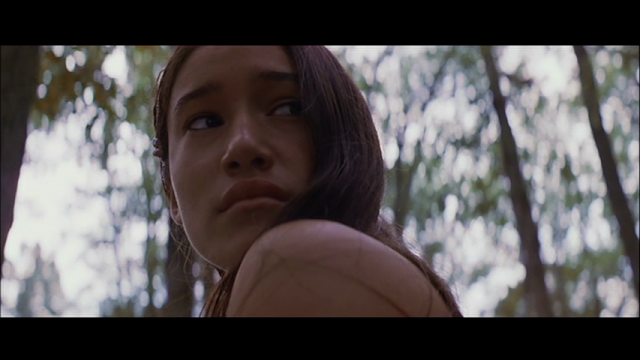There is the buildup of a devotional instrumentation that consistently returns to the gaze, her gaze. We are nearly always looking at her looking at others, at her lovers, at "Mother Nature"; we are watching her in the act and emotionality of love. Her lifespan feeds and absorbs the lifespan of the film. If she is in love, she compels others to love her. (And the camera certainly loves her.) We are compelled to watch her gaze and study her smile, her eyes, her hands:
But romance almost always ends, even if nature -- cradle of romance -- does not. Pastorals terminate in marriages, but the newlyweds nearly always take off their rustic dress and return to England, to courts and well-trimmed gardens, to the "artificial and civilized." With Hart Crane we'll recall that the time of harvest would be the time of death, sparagmos, her youth taken away with the bleeding of the pomegranate, the turning of the seasons:
She ran the neighing canyons all the spring;
She sprouted arms; she rose with maize -- to die.
We know that she will marry another man (who turns out, per the film, to be Christian Bale/John Rolfe, "a good man"). We know also that she'll visit England at the request of the king and queen. She goes there to effect the marriage of Old World with New World; she goes there, risen with the maize, to die. She is buried there, and we can assume that with the final shot, she has merged with Nature (the "mother" she constantly refers to, with whom she shares her inmost thoughts, in voice-over). She becomes the "Tree of Life." She has, moreover, given birth to a child who has old and new blood in him; she leaves behind a family, a union of disparate parts, a heritage for a new race of poets to build upon.
There was a bed of leaves, and broken play
There was a veil upon you, Pocahontas, bride --
But the New World does not disappear with the fading of romance; it begins again in the formation of different, mature loves. Love of the family may very well be a righteous substitute for the love of the earth, the secret of the grain, children, genealogy. If her core was hidden in the gaze that dwelt on the gaze of others, she flashes back a smile that reflects your gaze on her, and
Then you see her truly -- your blood remembering its first invasion of her secrecy, its first encounters with her kind, her chieftain lover... his shade that haunts the lakes and hills.
















No comments:
Post a Comment